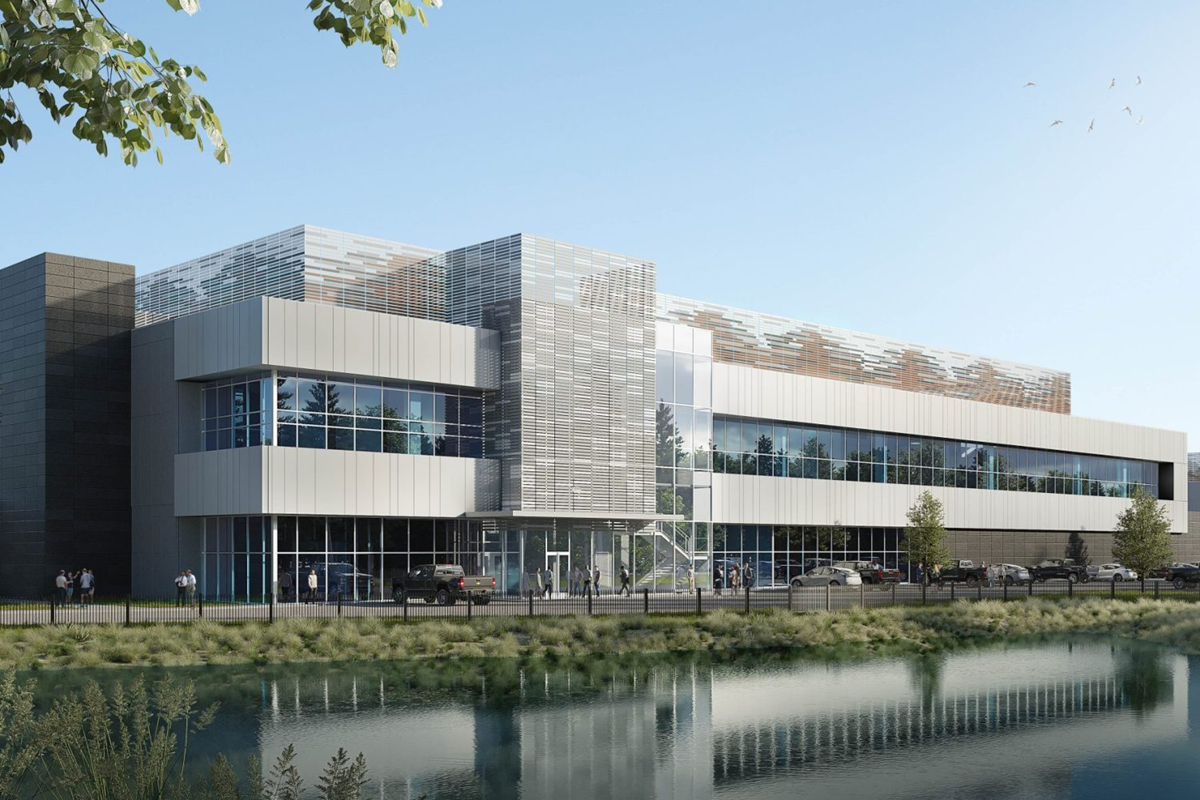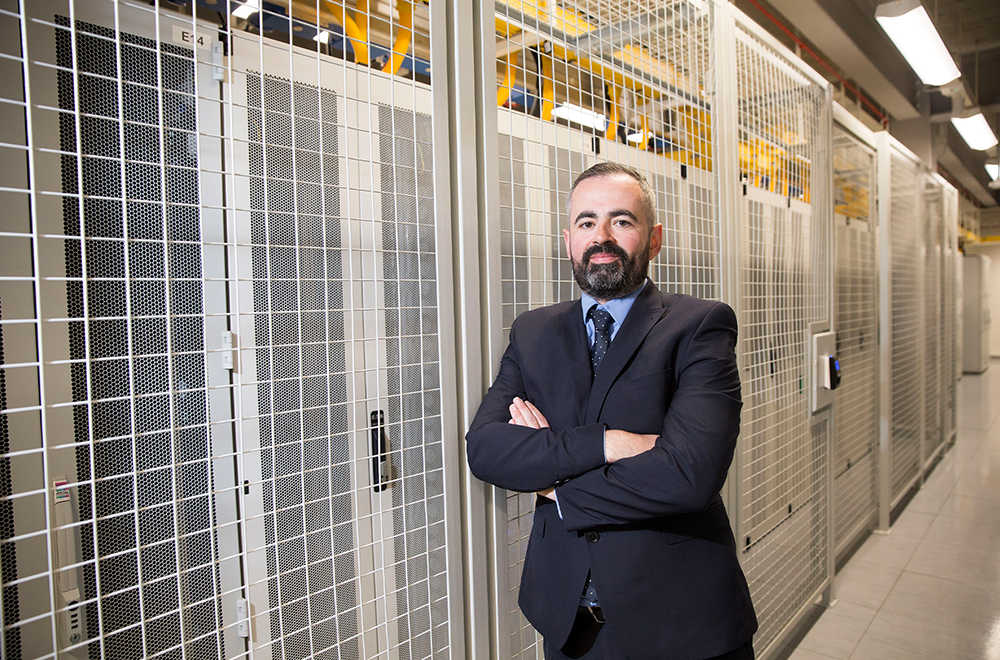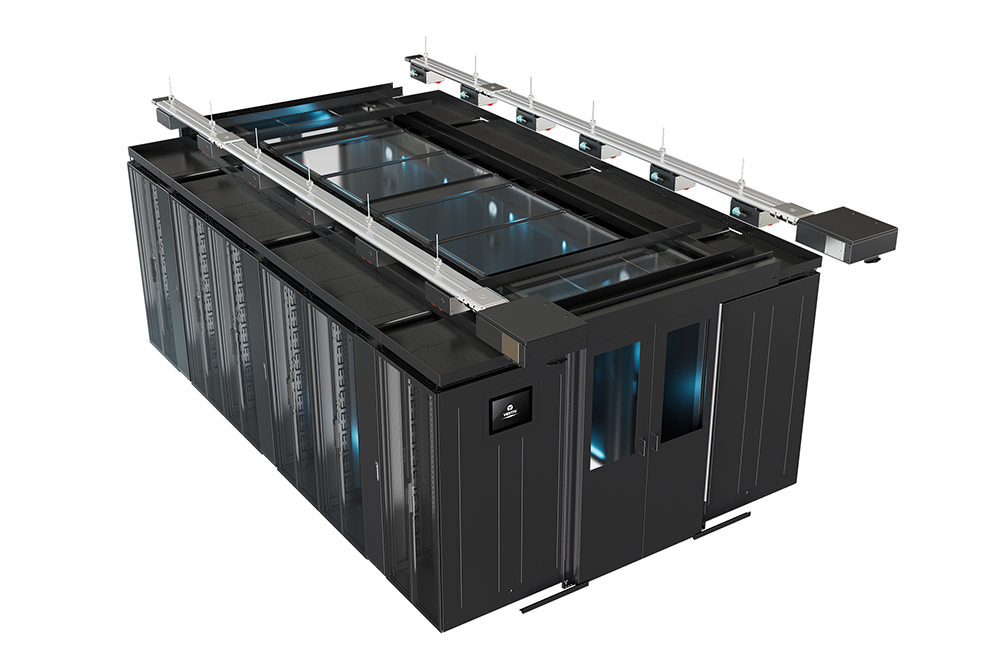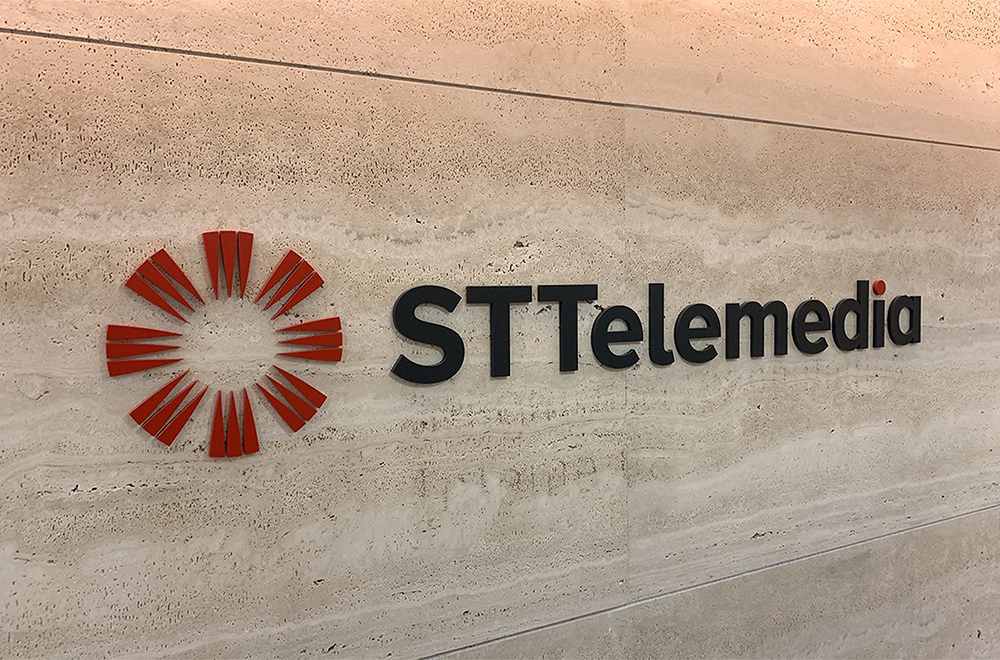Data Centre Operations: Optimising Infrastructure for Performance and Reliability
Data Centres
Hyperscale Data Centres: Scale, Speed & Strategy
News
Corscale Data Centers announces partnership with Affinius
Corscale Data Centers and Affinius Capital have announced a strategic partnership for hyperscaler development and a supply exclusivity agreement with e2Companies, a provider of integrated solutions for on-site power generation, distribution and energy cost-optimisation.
Under the strategic partnership, Corscale will become the exclusive hyperscale data centre developer to offer use of e2’s R3Di System (pronounced 'Ready') in the US, for an initial 24-month term. While there is no obligation for Corscale and Affinius to purchase a specific number of e2’s R3Di Systems, the strategic partnership is targeted to initially include the use of more than 300MW of e2 R3Di systems to fulfil the energy needs of part of the Corscale hyperscale data centre development project pipeline. Management of Corscale, Affinius and e2 believe there is a potential for considerably more collaboration after this initial deployment.
The R3Di is designed for data centres looking to achieve energy independence and match the volatile power demands of next-generation AI chips, and it will enable Corscale and Affinius to leverage future power capacity and future advancements of the Virtual Utility platform.
James Richmond, CEO of e2Companies, comments, “We are beyond excited about the prospect of partnering with Corscale and Affinius. They understand the technology required to power the AI-data centre boom over the next decade. Every industry is being revolutionised by next-gen AI capabilities. Our combined goal is to provide clean, reliable, and efficient energy to power this revolution.”
Corscale CEO, Robert Fields, adds, “Corscale is built to address hyperscale client needs and provide the mission critical infrastructure that their customers require to store, process, and analyse data. This potential partnership would bring e2’s on-site power generation, energy storage and grid optimisation technology to our clients, fulfilling our commitment to deliver creative solutions to meet the expected quality, efficiency, and reliability to achieve their goals.”
Len O’Donnell, Chairman & CEO for Affinius Capital, remarks, “For more than four decades, Affinius has embraced the implementation of new technologies that we believe will enhance outcomes for our investors. Innovation is one of our core values, presenting our intention to pioneer new concepts and improve upon current practices to pave the way to a more advanced and dynamic tomorrow. This belief is at the forefront of our investment in Corscale, and I can’t think of any area where innovative new technologies can have a greater impact than in data centre development.”
The Virtual Utility system addresses several challenges arising from the AI data centre boom and global electrification of economies. Costs and timelines to make the traditional electric grid capable of meeting growing demand are significant, with electric utility interconnections often taking five or more years to be completed, if completed at all. In this environment, localised microgrids, such as those enabled by e2’s systems, have emerged as turnkey solutions for delivering reliability and meeting the world’s growing electricity demand.
The patented R3Di System is a self-contained power platform installed without requiring an interconnection agreement or costly public utility upgrades. The R3Di provides clean and conditioned prime power, instantaneous full-load pickup and absorbs a much higher range of load profiles than traditional systems, including the throttling demands of next-gen AI chips, such as those from Nvidia, AMD, and Intel.
Nic Bustamante, Chief Technology Officer at Corscale, comments, “e2 and Corscale plan to deploy the innovative R3Di technology in parallel with next generation hyperscale advancements. Through this novel stack, we expect that we would be able to independently power our data centres, while supporting sophisticated AI GPU servers and racks across our platform with sustainable, future proof infrastructure.
“Our ‘building as a machine’, AI factory approach, is intended to scale rack densities beyond one megawatt, yet be equally well suited to cloud workloads. This could be a true game changer with first of kind capabilities for real time utility power coordination, power quality shaping, and dynamic automation at multi-gigawatt scale."
In addition, the R3Di works in combination with the Grove365, a centralised operations hub from e2 that delivers real-time monitoring, comprehensive data models, and predictive analysis for demand-side energy management. The Grove365 currently monitors 490 assets at 165 locations globally and has operated for a total of over 90 million grid monitoring hours.
Corscale Data Centers, along with Affinius Capital as its investment partner, launched the vertically integrated development platform for data centres in 2021 with a singular focus on the hyperscale client from day one. Corscale designs, builds, and operates sustainable, high-density data centres for some of the largest and most advanced technology companies in the world. The Virtual Utility solution will be available to Corscale’s hyperscale clients as its current $25 billion pipeline and future projects are developed.
For more from Corscale Data Centers, click here.
Simon Rowley - 22 April 2025
Data Centres
Hyperscale Data Centres: Scale, Speed & Strategy
Insights into Data Centre Investment & Market Growth
News
Townsend Group invests in CleanArc Data Centers
CleanArc Data Centers, a developer and operator of renewables-focused hyperscale data centre campuses, announced today that Townsend Group, an advisor and partner to institutional investors globally, has made a strategic investment in the company.
The investment was led by Townsend, which advises a consortium of global investors, including some of the largest sovereign and pension plans pursuing strategic stakes in leading investment and operating platforms. This new partnership further supports CleanArc’s growth initiatives as it continues developing its first data centre campus in Virginia, set to deliver 300 MW of capacity by Q1 2027.
“We’re excited to welcome Townsend as a strategic investment partner,” says James Trout, Founder and CEO of CleanArc. “Their capital markets expertise, institutional knowledge, and private real assets scale will be instrumental as we execute on our mission to develop the data centres of the future, particularly our inaugural campus in Virginia, VA1. Townsend brings a demonstrated track record of supporting transformative businesses throughout their growth journeys. And with Snowhawk’s ongoing investment leadership, we’re well-equipped to continue tackling the growing data centre challenges faced by hyperscalers.”
“CleanArc’s strong team of industry veterans and their shrewd approach to site selection, development and power structuring really sets them apart,” adds Anthony Frammartino, CEO and Chairman, at Townsend. “We’re excited to support the company’s continued development of leading data centre campuses across Tier 1 markets.”
Snowhawk LP will remain the majority stakeholder in CleanArc as the company continues to solidify partnerships with hyperscale customers and expand infrastructure in key markets.
“Snowhawk is delighted to partner with Townsend on this strategic investment in CleanArc, further accelerating innovation and the development of capacity to support the next generation of AI and cloud capabilities,” remarks Brian McMullen, Managing Partner and Co-Founder of Snowhawk Partners.
“CleanArc continues to set new standards in future-focused data centre development,” concludes Greg Stamas, Managing Director at Snowhawk. “In partnership with Townsend and our other investors, we are excited to support CleanArc’s continued leadership in sustainability and renewable energy use.”
For more from CleanArc Data Centers, click here.
Simon Rowley - 17 April 2025
Artificial Intelligence in Data Centre Operations
Data
Data Centre Operations: Optimising Infrastructure for Performance and Reliability
News
Fluidstack selects VAST Data to power AI workloads
VAST Data, an AI data platform company, today announced that Fluidstack, the AI cloud platform, has selected the VAST Data Platform to join other partners in helping to power large-scale, high-performance AI workloads for Fluidstack’s global customer base. With VAST, Fluidstack can deliver enterprise-grade stability, security, and innovation for some of the most demanding AI training environments in the world.
Fluidstack has built its business by managing end-customer workloads on third-party compute capacity – from VAST-powered AI cloud service provider customers to building dedicated GPU clusters on behalf of clients. Pushing the boundaries of what managed services can offer, Fluidstack uses a flexible problem-solving approach to help end customers manage and scale their workloads with unmatched reliability and agility.
Our mission at Fluidstack is to take the complexity out of deploying and scaling AI infrastructure for our customers,” says César Maklary, President & Co-Founder of Fluidstack. “VAST’s platform gives us the advanced enterprise capabilities we need to deliver reliable, scalable, secure, and future-proof AI infrastructure for our customers as they build cutting-edge models to further AI adoption.
The VAST Data Platform provides Fluidstack’s end customers with:
• Reliable, secure data management: VAST’s enterprise-grade stability, multi-tenant security, and reliability were critical in supporting the demanding AI workloads that Fluidstack manages for customers, while the VAST DataStore’s multi-protocol support (S3, NFS, SMB) offered seamless interoperability for diverse application needs.• Future-proof AI infrastructure: To further support Fluidstack in building, operating, and managing AI infrastructure and workloads for customers, the VAST DataEngine provides integrated vector search capabilities, automated triggers, and intelligent data processing functions designed for large-scale model training and inference. Combined with the real-time data awareness and scalable semantic indexing of the VAST InsightEngine, Fluidstack is well-positioned to deliver increasingly intelligent, responsive, and globally efficient AI infrastructure services.• Fast access to distributed data at limitless scale: The VAST Data Platform’s unique Disaggregated Shared-Everything (DASE) architecture ensures these deployments can reach exabyte scale while remaining cost-efficient—helping Fluidstack empower organisations to use distributed datasets and enable globally-synchronised model training.• Bringing structure to unstructured data: The VAST DataBase serves as a transactional data lakehouse that supports trillions of vectors, allowing Fluidstack customers to index the entirety of their distributed data corpus for AI deployments - providing real-time data access for efficient querying, analysis, and retrieval of massive datasets.
Fluidstack’s innovative approach to AI infrastructure delivery requires a data platform that can operate globally, securely, and with the performance to match cutting-edge AI workloads,” says Renen Hallak, Founder & CEO of VAST Data. “Together with Fluidstack, we’re helping customers turn visionary projects into reality. The combination of Fluidstack’s dynamic managed services with VAST’s global data fabric and advanced enterprise features is unlocking new possibilities for AI model training and development at scale.
For more from VAST Data, click here.
Simon Rowley - 17 April 2025
Data Centres
Hyperscale Data Centres: Scale, Speed & Strategy
News
DataVita earns UK's first 'gold standard' OCP status
DataVita has become the first data centre operator in the UK to achieve an industry-leading accreditation - Open Compute Project’s (OCP) Ready for Hyperscale certification - recognising the capabilities of its DV1 facility in supporting high-density workloads and AI.
So far, this certification has only been awarded to three other companies in Europe and is one of the sector’s most recognised and sought-after accreditations.
The initiative is designed to give recognition to multi-tenant data centres that can accommodate the larger scale, higher density and more advanced infrastructure requirements of hyperscale operations – including the ability to provide liquid cooling.
A rigorous assessment included elements such as logistics, site access, foundational building infrastructure and network connectivity, as well as DataVita’s commitment to innovation, efficiency and sustainability at its DV1 facility located in Chapelhall, North Lanarkshire.
Underpinned by its focus on infrastructure for high-performance computing (HPC) and AI, the company recently announced plans to grow data centre capacity to 1GW in central Scotland over the next five years, powered by independent renewable energy sources.
Danny Quinn, Managing Director of DataVita, says, “Achieving what is widely considered one of the gold standards in industry accreditations solidifies our position as a market-leader and confirms the expertise we have for handling high-density levels of computing. AI has huge growth potential for the future and has quickly become a core focus for the business, and we have invested heavily in making sure we can support the infrastructure that it requires.
“Scotland’s mix of renewable energy – with the lowest carbon intensity compared to anywhere else in the UK – and a naturally cooler climate means we can also offer significant sustainability benefits for global customers. Only a few facilities have liquid cooling capability, for example, but we can do it with a lower carbon footprint.
“Our goal is to ensure that AI adoption does not come at the expense of the environment. The OCP status reflects that, and we hope it will open up new conversations with existing and potential clients considering locating in Scotland.”
Carly Weller - 14 April 2025
Artificial Intelligence in Data Centre Operations
Data
Data Centre Operations: Optimising Infrastructure for Performance and Reliability
Enterprise Network Infrastructure: Design, Performance & Security
News in Cloud Computing & Data Storage
Juniper and Google Cloud enhance branch deployments
Juniper Networks has announced its collaboration with Google Cloud to accelerate new enterprise campus and branch deployments and optimise user experiences. With just a few clicks in the Google Cloud Marketplace, customers can subscribe to Google’s Cloud WAN solution alongside Juniper Mist wired, wireless, NAC, firewalls and secure SD-WAN solutions.
Unveiled at Google Cloud Next 25, the solution is designed to simply, securely and reliably connect users to critical applications and AI workloads whether on the internet, across clouds or within data centres.
“At Google Cloud, we’re committed to providing our customers with the most advanced and innovative networking solutions. Our expanded collaboration with Juniper Networks and the integration of its AI-native networking capabilities with Google’s Cloud WAN represent a significant step forward,” says Muninder Singh Sambi, VP/GM, Networking, Google Cloud. “By combining the power of Google Cloud’s global infrastructure with Juniper’s expertise in AI for networking, we’re empowering enterprises to build more agile, secure and automated networks that can meet the demands of today’s dynamic business environment.”
AIOps key to GenAI application growth
As the cloud expands and GenAI applications grow, reliable connectivity, enhanced application performance and low latency are paramount. Businesses are turning to cloud-based network services to meet these demands. However, many face challenges with operational complexity, high costs, security gaps and inconsistent application performance. Assuring the best user experience through AI-native operations (AIOps) is essential to overcoming these challenges and maximising efficiency.
Powered by Juniper’s Mist AI-Native Networking platform, Google’s Cloud WAN, a new solution from Google Cloud, delivers a fully managed, reliable and secure enterprise backbone for branch transformation. Mist is purpose-built to leverage AIOps for optimised campus and branch experiences, assuring that connections are reliable, measurable and secure for every device, user, application and asset.
“Mist has become synonymous with AI and cloud-native operations that optimise user experiences while minimising operator costs,” says Sujai Hajela, EVP, Campus and Branch, Juniper Networks. “Juniper’s AI-Native Networking Platform is a perfect complement to Google’s Cloud WAN solution, enabling enterprises to overcome campus and branch management complexity and optimise application performance through low latency connectivity, self-driving automation and proactive insights.”
Google’s Cloud WAN delivers high-performance connections for campus and branch
The campus and branch services on Google’s Cloud WAN driven by Mist provide a single, secure and high-performance connection point for all branch traffic. A variety of wired, wireless, NAC and WAN services can be hosted on Google Cloud Platform, enabling businesses to eliminate on-premises hardware, dramatically simplifying branch operations and reducing operational costs. By natively integrating Juniper and other strategic partners with Google Cloud, Google’s Cloud WAN solution enhances agility, enabling rapid deployment of new branches and services, while improving security through consistent policies and cloud-delivered threat protection.
Carly Weller - 11 April 2025
Artificial Intelligence in Data Centre Operations
Cooling
Data
Data Centre Operations: Optimising Infrastructure for Performance and Reliability
Data Centres
Liquid Cooling Technologies Driving Data Centre Efficiency
Compu Dynamics launches AI and HPC Services unit
Compu Dynamics has announced the launch of its full lifecycle AI and High-Performance Computing (HPC) Services unit, showcasing the company’s end to end capabilities.
The expanded portfolio encompasses the entire spectrum of data centre needs, from initial design and procurement to construction, operation and ongoing maintenance, with a particular emphasis on cutting-edge liquid cooling technologies for AI and HPC environments.
Compu Dynamics’ new AI and HPC service offerings build on the company’s expertise in white space deployment, including advanced liquid cooling and post-installation services. As a vendor-neutral solutions provider, the company is uniquely positioned to support equipment from virtually every manufacturer with no geographical limitations, ensuring clients receive unbiased recommendations and optimal solutions tailored to their specific requirements.
"Our advanced AI and HPC service offerings represent a significant evolution in data centre services," says Steve Altizer, President and CEO of Compu Dynamics. “We have created this team to respond to the accelerating demand for highly-qualified technical support for high-density AI data centre infrastructure. By working with a variety of OEM partners and offering true end-to-end solutions, we are empowering our clients to focus on their core business while we handle the complexities of their modern critical infrastructure."
The company’s holistic solutions portfolio addresses the growing need for specialised support in high-density computing environments. Compu Dynamics’ innovative liquid cooling solutions are said to offer superior efficiency and reduced energy consumption, making them essential for future-ready data centres. Key highlights of these service offerings include:
· Equipment evaluation, design consultation and procurement.
· Power distribution and liquid cooling system installation, startup, commissioning and quality assurance/quality control.
· Flexible maintenance service options designed for seamless, worry-free support including comprehensive fluid management, coolant sampling and contamination and corrosion prevention.
· Onsite staffing for day-to-day technical operations.
· Dedicated customer success manager.
· 24x7 emergency response team for technical issues and repair services.
"As AI and HPC workloads drive unprecedented demand on data centre infrastructure, our liquid cooling expertise has become increasingly crucial,” says Scott Hegquist, Director of AI/HPC Services at Compu Dynamics. “We're committed to helping our clients navigate these challenges, providing cutting-edge solutions that optimise performance, efficiency and sustainability."
Carly Weller - 11 April 2025
Data Centre Operations: Optimising Infrastructure for Performance and Reliability
Edge Computing in Modern Data Centre Operations
Enterprise Network Infrastructure: Design, Performance & Security
News
Vertiv upgrades SmartAisle for efficient edge computing in EMEA
Vertiv has announced a significant upgrade to its Vertiv SmartAisle solution, designed specifically for edge computing applications up to 180kW.
Now available across Europe, the Middle East and Africa (EMEA), this complete pre-engineered system combines power, cooling, racks and advanced management and monitoring capabilities in a single integrated unit, designed to simplify and quicken edge computing deployments. In line with the European Union Energy Efficiency Directive (EED) the system provides energy efficient operation and includes power usage effectiveness (PUE) monitoring to help organisations track operations alongside their responsible business goals.
"The upgraded Vertiv SmartAisle really changes the game when it comes to effective and successful edge deployments", says Giuseppe Leto, Senior Director IT Systems Business at Vertiv in EMEA. "We've made it easier, faster and more cost-effective for businesses to scale and grow their IT operations. The pre-engineered system eliminates the traditional challenges of planning of multiple equipment installations and logistics while providing customers with a complete, reliable end-to-end solution that allows data centre operators to monitor energy efficiency requirements following the latest EU regulations.”
The embedded Vertiv RDU501 intelligent infrastructure management appliance allows data centre operators to control system operations in real-time 24/7, offering a consolidated and easy to use monitoring and management platform. In addition, the Vertiv approach to pre-engineered, edge smart solutions helps organisations reduce planning, design and site preparation time by up to 80% while lowering deployment costs by up to 30% compared to a brick-and-mortar alternative, while the integration of all components is designed to achieve up to 20% higher energy efficiency compared to industry averages.
Vertiv SmartAisle is part of Vertiv’s growing portfolio of flexible, fully pre-engineered modular solutions. The system is available as standard in four different reference designs, with the ability to scale up to 180kW IT load and features N+1 redundancy for both power and cooling systems.
Key features and benefits include:
· Advanced 24/7 monitoring of energy consumption and capacity management
· Precise environmental monitoring with six sensors per server rack
· High efficiency, modular uninterruptible power supply (UPS) systems
· Power distribution through power bars or floor-mounted PDUs
· Integrated power monitoring via rack-mounted power distribution units (rPDU)
· Adaptive direct expansion cooling system with 20-100% modulating capacity
· Enhanced thermal efficiency through cold aisle containment
· Advanced physical security with e-handles and IP cameras
· Scalable architecture enabling standardised deployment across multiple edge sites
Carly Weller - 10 April 2025
Artificial Intelligence in Data Centre Operations
Data Centre Operations: Optimising Infrastructure for Performance and Reliability
Data Centres
STT GDC India launches AI-ready campus in Kolkata, India
ST Telemedia Global Data Centres (India) (STT GDC India) is set to revolutionise the data centre landscape in Eastern India with the launch of its state-of-the-art AI-ready campus in New Town, Kolkata, India.
Spanning 5.59 acres, this next-generation campus is engineered to support the growing demands of AI computing with high-density rack configurations, advanced cooling systems, and a scalable, modular design. It aligns with the larger economic goals of the country to promote digitally enabled growth and broaden access to sustainable digital infrastructure.
The new age data centre facility has earned the prestigious TIA-942 Rated-3 Design certification, underscoring its commitment to world-class infrastructure and reliability. The campus provides a significant boost to digital infrastructure creation in the eastern part of the country with scalable capacity of up to 25MW in terms of overall IT load. It incorporates forward-thinking power architecture with an N+2C design for reliability and a radial N+N configuration for main power incomers, ensuring dedicated feeder availability. The campus utilises TYPE-TESTED Compact Substations and LV DGs, setting new standards in power reliability and efficiency.
Bimal Khandelwal, CEO of STT GDC India, says, "This expansion is a gateway to accelerating AI innovation in Eastern India. Our Kolkata campus is specifically designed to support the burgeoning AI ecosystem, from startups developing local language AI models to enterprises deploying large language models. The facility’s high-performance computing capabilities and low-latency connectivity will empower organisations to build and deploy AI solutions that drive digital transformation across sectors”.
The facility is built with a concurrently maintainable infrastructure ensuring zero Single Points of Failure (SPOF). It boasts a modular design with flexibility for liquid cooling technologies, supporting the next generation of high-performance computing workloads. The Kolkata data centre prioritises sustainability with a low-PUE (Power Usage Effectiveness) cooling design, incorporating water conservation techniques through closed-loop cooling, rainwater harvesting and greywater reuse. The facility also employs low-GWP refrigerants to reduce carbon footprint, reinforcing STT GDC India's commitment to environmental responsibility.
Having launched in March 2025, this Kolkata facility expands STT GDC India's nationwide footprint to 30 data centres across 10 cities with a total IT load capacity of 400MW. Its strategic location in New Town’s Silicon Valley positions it as a crucial hub for AI development, serving enterprises, hyperscale cloud service providers and government organisations.
This investment aligns with India's growing focus on artificial intelligence and the increasing demand for AI-ready digital infrastructure. The facility will support diverse AI-driven initiatives, from natural language processing in regional languages to computer vision applications in manufacturing and healthcare, ensuring high reliability, energy efficiency and environmental sustainability.
Carly Weller - 7 April 2025
Artificial Intelligence in Data Centre Operations
Data Centre Operations: Optimising Infrastructure for Performance and Reliability
Data Centres
News in Cloud Computing & Data Storage
Raxio lands $100m to expand sub-Saharan African data centres
Raxio Group has signed an agreement for $100 million in financing from the International Finance Corporation (IFC) to accelerate Raxio’s expansion of data centres to power key technologies like AI, cloud computing and digital financial services – critical enablers of African economic growth and digital inclusion.
The debt funding from IFC will help Raxio double its deployment of high-quality colocation data centres within three years, addressing growing demand in underserved markets across the continent. The company is developing a Sub-Saharan African regional data centre platform in countries including Ethiopia, Mozambique, the Democratic Republic of Congo, Côte d’Ivoire, Tanzania and Angola.
Raxio is committed to bridging Africa’s digital divide by introducing Tier III-certified, carrier-neutral, and secure data services to markets that have been overlooked by other providers. With a focus on high-growth areas, the company is tapping into regions with significant economic potential to unlock new opportunities across the continent.
“Raxio’s business model shows how digital infrastructure can empower businesses, governments and communities to thrive in the digital economy,” says Sarvesh Suri, IFC Regional Industry Director, Infrastructure and Natural Resources in Africa. “This partnership between Raxio and IFC is set to strengthen Africa’s digital ecosystem and catalyse further investments and regional integration, building a more inclusive and sustainable future.”
“This funding from IFC is a powerful endorsement of Raxio’s vision and operational excellence,” says Robert Skjødt, CEO of Raxio Group. “It will allow us to bring critical infrastructure to the regions that need it most and attract further investment as we continue to grow. Together with our other partners, we’re building the foundation for Africa’s digital future and setting new benchmarks for sustainability.”
Raxio’s facilities are designed for 24/7 reliability, ensuring uninterrupted service even during maintenance or unforeseen disruptions. The company integrates renewable energy solutions to minimise its environmental footprint and uses innovative energy-efficient equipment to reduce electricity and water consumption for cooling in several of its countries of operation.
In the Democratic Republic of Congo, Raxio’s Kinshasa facility is poised to meet growing demand for data services in one of Africa’s largest and fastest-growing urban centres. In Côte d’Ivoire, Raxio is establishing a digital hub to serve Francophone West Africa, connecting regional markets and facilitating cross-border trade. These efforts are empowering local businesses and integrating them into the global digital economy.
Carly Weller - 7 April 2025
Data Centre Operations: Optimising Infrastructure for Performance and Reliability
Data Centres
Edge Computing in Modern Data Centre Operations
Enterprise Network Infrastructure: Design, Performance & Security
News
nLighten introduces nConnect network service platform
nLighten, a digital infrastructure platform and a frontrunner in the European edge data centre market, has launched nConnect, its new network service platform which will deliver versatile network services across all nConnect enabled nLighten data centres throughout Europe.
Through the nConnect platform, businesses can seamlessly connect to data centres, internet, and cloud providers, ensuring high-performance and low-latency access across Europe. Built on a resilient, route-diverse network spanning 12 of nLighten’s 34 edge data centre locations, the platform is supported by the latest data centre networking architecture.
nConnect provides clients with a range of services, including Cloud Connect, DC Connect, Direct Internet Access (DIA), and IP Transit (IPT), all integrating with their presence in nLighten data centres. This ensures "effortless connectivity and streamlined network integration,", according to nLighten, offering clients:
- Quick provisioning and flexible bandwidth options- Latest data centre networking architecture supporting segmentation, DDoS protection, and advanced analytics- Standardised SLA and pricing model with no long-term contracts- One-stop shop for multiple services, reducing complexity and costs
Joachim van Collenburg, VP of Product Management at nLighten, highlights the advantages of nConnect, stating, “With nConnect, customers benefit from ultra-fast provisioning, flexible bandwidth options, and the latest data centre networking architecture. This is particularly valuable for businesses looking to establish an edge performance hub in a new region, or enterprises seeking cost-effective disaster recovery solutions with built-in geo-redundancy.”
nConnect is now available in four of the seven markets where nLighten operates, including:
- The Netherlands: Amsterdam (AMS1 and AMS2)- Germany: Frankfurt (FRA1)- France: Paris (PAR2)- United Kingdom: Birmingham (BHX1), Bristol (BRS1), Chester (MAN1), Leeds (LBA1), Liverpool (PLP1), Milton Keynes (LTN1), Nottingham (EMA1), and Swindon (BRS2).
A phased rollout to additional nLighten edge data centres is planned later this year, ensuring low latency and high-performance connectivity across Europe.
Data privacy is a cornerstone of nConnect, and the platform thus delivers a high-performance, resilient network using best-in-class intelligent networking technology. Private Ethernet networks and protected IP services ensure secure and efficient data handling, making nConnect ideal for AI-driven, high-density, and critical environments.
Businesses can take advantage of nConnect services immediately to enhance their connectivity, scalability, and resilience.
For more from nLighten, click here.
Simon Rowley - 21 March 2025

Head office & Accounts:
Suite 14, 6-8 Revenge Road, Lordswood
Kent ME5 8UD
T: +44 (0)1634 673163
F: +44 (0)1634 673173









